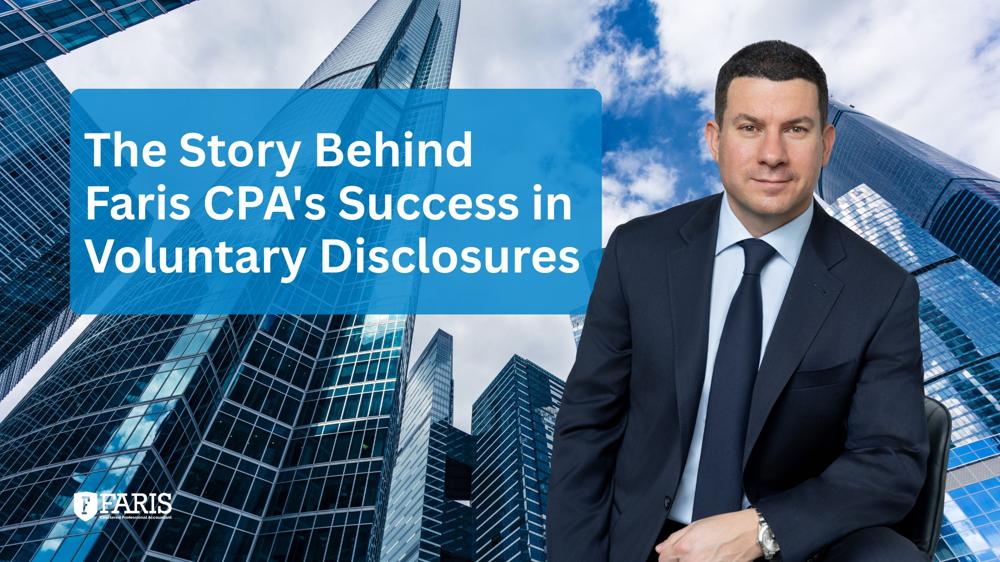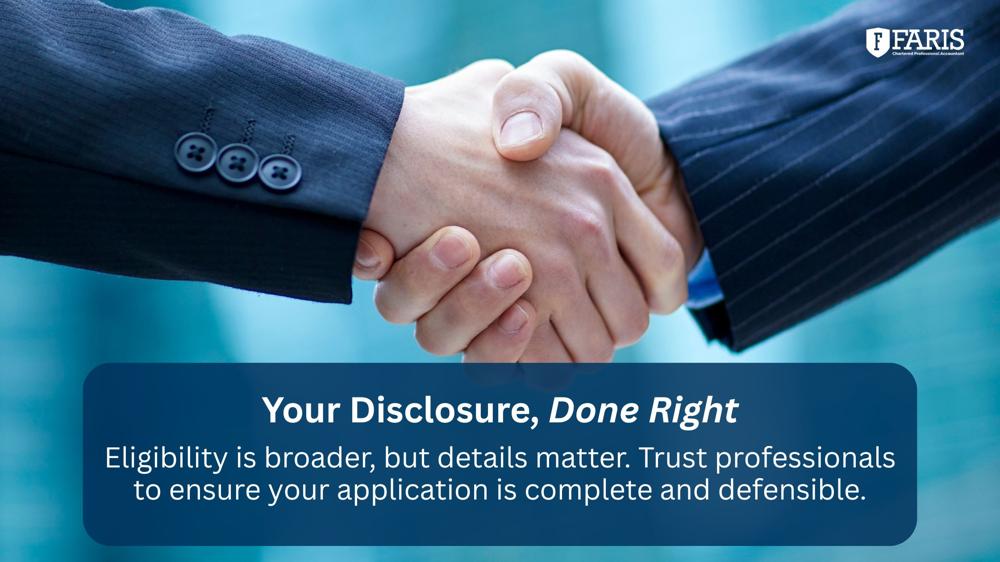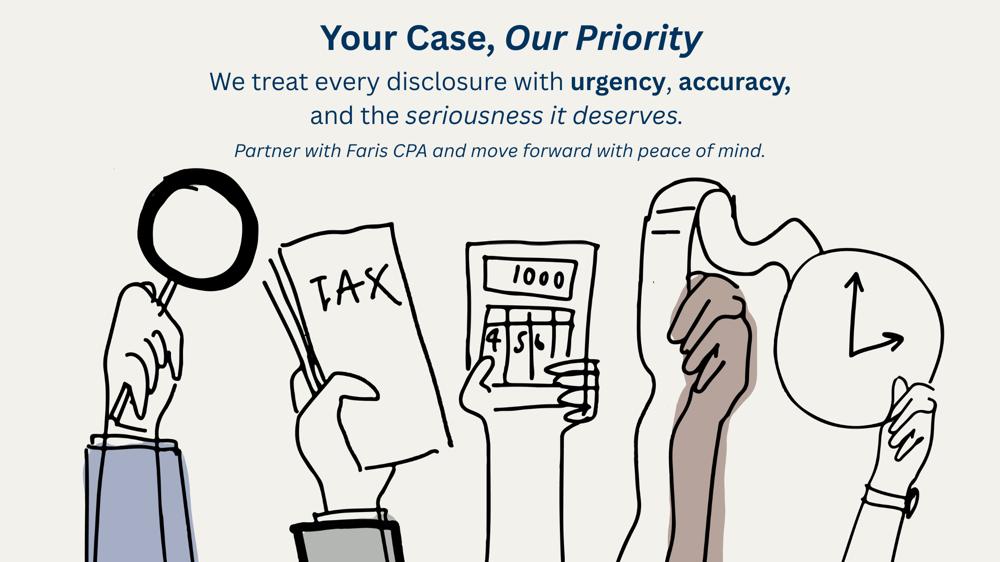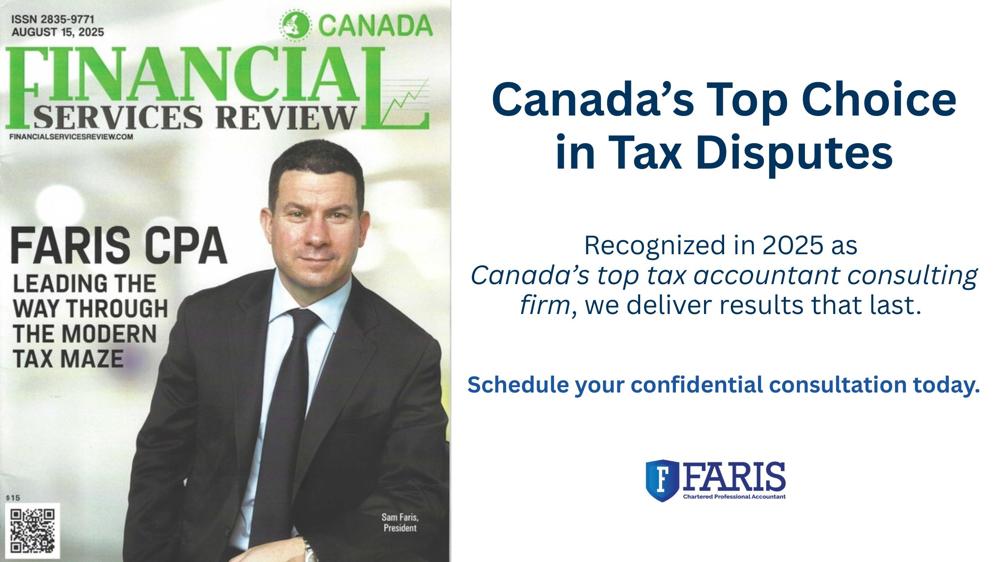
When Canadian taxpayers who need it first hear of Canada's "tax amnesty" system, the Voluntary Disclosures Program (VDP), it can stir up a mix of hope and unease. On one hand, it's a lifeline that offers a chance to correct past tax mistakes without facing the full weight of penalties and interest.
But for those with significant unpaid taxes and looming penalties and interest, it can be an intimidating process that seems too complex or risky to navigate alone. What's certain is that the stakes are high: timing, accuracy, and strategy can make all the difference between an accepted disclosure and a mountain of taxes, penalties, and interest.
Behind every disclosure needing to be made is a personal story: a widower inheriting an overseas bank account that hasn't been reported to Canada Revenue Agency (CRA), earnings from crypto improperly reported as capital gains, a self-employed contractor who overreported expenses and underreported income, a content creator needing to file and pay CRA OnlyFans taxes, an Uber driver with years of unfiled tax returns.
Voluntary Disclosure Help.ca was created by the team at Faris CPA for those scenarios and more. We believe that people deserve a second chance, and are passionate about levelling the playing field for individuals in tax trouble with CRA. Get to know more about the Voluntary Disclosures Program and Faris CPA, and bookmark our site as a go-to source for expert insights on the VDP and other tax-related issues.
Overview & Purpose of the Voluntary Disclosures Program
The Voluntary Disclosures Program is designed to give taxpayers a second chance when past filings have been overlooked, incomplete, or inaccurate, and taxes are owing to the government. Administered by the CRA, the program provides a structured pathway for individuals and businesses to come forward before the government initiates enforcement action.
The central idea is to encourage voluntary compliance by reducing or eliminating some of the harsh financial penalties and interest that would otherwise apply, and to, mostly, provide assurance that a taxpayer won't face criminal charges for their actions related to an accepted disclosure. Even if the CRA accepts a voluntary disclosure, however, if they discover further non-compliance or illegal activity, the taxpayer can still face prosecution.
The VDP attempts to balance fairness with practicality. The CRA recognizes that mistakes happen, whether through misunderstanding the rules, unintentional oversight, or life circumstances that make tax obligations difficult to meet. By offering this program, the CRA aims to bring more people into compliance, collect outstanding taxes, and ultimately strengthen the integrity of the tax system. For taxpayers, the purpose is straightforward: resolve outstanding issues in a controlled, less punitive environment. An accepted disclosure helps mitigate financial and legal exposure, but it also restores peace of mind.

Program Changes & Updates
As of October 1, 2025, the CRA is rolling out major changes to its Voluntary Disclosures Program (VDP), intended to make it more accessible, clearer, and more flexible as part of a 100-day plan to fix what Canada's Finance Minister called "unacceptable" levels of service and communication in 2025. Below are the key updates to eligibility, relief, documentation, and scope.
Eligibility & Exclusions
- Taxpayers who have received non-specific communications from the CRA (for example, an "educational letter" about potential non-compliance) may now qualify under the new regime as an "Unprompted" disclosure.
- Taxpayers who receive a more specific letter requesting that they provide updated information by a specific date may still also be eligible for the VDP under the "Prompted" stream. These prior contacts will not automatically disqualify an applicant.
- However, taxpayers under active audit, investigation, or those deemed to be "egregiously or intentionally non-compliant" remain excluded.
- The CRA has relaxed the rules around second (and subsequent) disclosures: under the new rules, a taxpayer may make a second VDP application (if it relates to a different matter or under circumstances beyond their control), whereas under previous rules, a second application was only eligible if it met both those criteria.
Relief from Penalties & Interest
- The old "General / Limited" tracks are being replaced by a new two-tier relief structure:
- General relief (for "unprompted" disclosures) allows 100% penalty relief and 75% interest relief.
- Partial relief (for "prompted" disclosures) allows up to 100% penalty relief and 25% interest relief.
- Importantly, under the new policy, the CRA will grant penalty relief even in cases where only interest would otherwise apply, broadening eligibility.
- Where GST/HST "wash transactions" are involved, full relief (100% of penalties and interest) remains available when a supplier fails to charge and collect GST/HST from a recipient that is a registrant and entitled to a full input tax credit, resulting in no net loss to the government.
Documentation & Time Windows
- The CRA now provides clearer benchmarks for how many years of records must be provided:
- Up to 10 years of foreign income or assets,
- Up to 6 years for Canadian-sourced income or assets,
- Up to 4 years for GST/HST matters,
- However, the CRA retains the discretion to request records from years outside those limits if needed.
- Supporting documentation must be complete and clearly reconciled (e.g. amended returns, schedules, statements). Half disclosures or incomplete support are more likely to be rejected.
- A redesigned Form RC199 (VDP application) was created to simplify the filing process.
Expanded Scope
The updated VDP explicitly broadens the range of tax statutes covered, including:
- Greenhouse Gas Pollution Pricing Act (fuel charges)
- Luxury tax under the Select Luxury Items Tax Act
- Digital Services Tax Act
- Underused Housing Tax
- Global Minimum Tax
- Other existing ones like Income Tax, Excise Tax, GST/HST, Softwood Lumber Export Charge, Air Travellers Security Charge
Practical Impact of Changes
For taxpayers, these updates and relaxed rules mean now is the time to take advantage of the financial benefits and start reducing the interest payable.

Applying to the VDP
Getting into the Voluntary Disclosures Program (VDP) is more than just filling out a form; you must follow a precise process, satisfy financial conditions, and consider whether associated relief or compliance pathways might better suit your situation.
Application Process & Form RC199
Beginning October 1, 2025, the CRA will use a redesigned Form RC199 (VDP Application), which is intended to simplify submissions.
You'll need to provide (a) a clear statement of what is being corrected, (b) all necessary supporting documentation (amended returns, schedules, statements), and (c) reconciliations showing how your original filings differ from corrected ones.
In most cases, you only need to submit documentation covering the past 6 years for Canadian-sourced income/assets and 10 years for foreign-sourced matters. However, the CRA reserves the right to request information beyond those periods if needed.
Once you've assembled your application, you submit it to CRA's designated VDP unit. The CRA will review whether your case meets voluntariness, completeness, and eligibility conditions under the new framework (i.e. whether it qualifies under "unprompted" or "prompted" relief).
Payment & Financial Obligations
The full amount of tax owing must still be paid or proposed via a payment arrangement. In situations where paying in full upfront is not feasible, you can request a payment plan, but you must demonstrate your financial position and ability (or inability) to pay. The CRA typically won't grant interest or penalty relief on amounts already assessed prior to filing the VDP.
Related Relief & Other Compliance Programs
VDP isn't the only path. If your situation involves tax years that are still within statutory limitations or under tax audit risk, you may need to consider alternative compliance programs (e.g. voluntary disclosures under specific statutes, remedial filings, making use of Canada's taxpayer relief provisions).
With all that being said, however, a disclosure must be carefully timed, legally supported, and strategically presented. While the program still provides significant relief compared to the consequences of discovery, you still need professional voluntary disclosure help from experts who know how to present your case to the CRA to ensure your application is accepted.
The Faris CPA Backstory
Sam Faris began his professional journey in 2003 as an articling student at a mid-sized firm in downtown Toronto. Unlike many who viewed articling as a stepping-stone, Sam saw it as an opportunity to master the intricate relationship between taxpayers and the Canada Revenue Agency. His early years were marked by long hours, relentless study of tax legislation, and a determination to understand not just the rules, but the strategies that govern how disputes unfold.
Building a Boutique Firm
After years of honing his skills, Sam launched his own practice. From the beginning, the firm was deliberately structured as a boutique: small enough to maintain personal involvement, yet specialized enough to focus exclusively on high-stakes tax disputes. Sam even went so far as to keep a mattress at the office during the early days, a symbol of his commitment to being available whenever a client needed him.

Growth & Specialization
What started as a one-man effort has evolved into a carefully selected team of CPAs, all trained to approach files as if they were courtroom exhibits: fully documented, defensible, and precise. This specialist model distinguished the firm from general accounting practices that divide attention across routine compliance work. Every file, whether an audit, objection, or voluntary disclosure, receives the scrutiny of at least two CPAs.
Reputation for Tenacity
Over the years, Faris CPA has earned a reputation for taking on the most complex cases, ones where millions can be at stake or where taxpayers face intense personal and financial stress. Sam's blunt honesty and disciplined process have made the firm a trusted ally across Canada. For Sam, it's about building a practice grounded in relentless preparation and client trust.
The Secrets to Our VDP Success
No file is ever handled by junior accountants or students at Faris CPA. Every disclosure is prepared, reviewed, and finalized by fully qualified CPAs trained specifically in tax dispute resolution. This senior-only model ensures that every number reconciles, every form is correct, and every argument is defensible. Mistakes are costly in the VDP process, and our structure is built to eliminate them.
Two-CPA Review
A cornerstone of our approach is the dual-review system: every file is examined by both Sam and a senior CPA tax accountant consultant on the team. This process provides not only accuracy, but also a defensive shield against CRA challenges. If an assumption is questioned, our submissions are already documented in a way that anticipates and neutralizes those challenges.
Integrated Legal Insight
Some disclosures require interpretation of statutes that border on legal territory. For these cases, our practice collaborates with experienced tax lawyers who can weigh in when a disclosure risks escalating beyond the administrative level. This integration means clients benefit from legal and accounting perspectives without gaps or overlaps.
Timing & Strategy
Success in the VDP is about acting quickly enough to preserve eligibility while carefully planning the narrative presented to the CRA. We prioritize speed in assessing whether a disclosure qualifies, then focus on assembling complete documentation so the CRA receives a file that is both timely and airtight.
Commitment to Clients
A major contributor to our success comes from treating every disclosure as if it were a criminal case. We communicate clearly, reduce client anxiety, and provide reassurance by outlining comparable cases and outcomes, as we understand how life-changing a denied VDP application or net worth audit can be. Clients know their file is being prepared with urgency, precision, and the seriousness it deserves.

Why Choose Faris CPA for Help with Your VDP Application
Faris CPA represents clients across Canada, from major urban centres to smaller communities. Geography is never a barrier; disclosures can be managed remotely with the same level of attention as if the client were sitting in our office. This nationwide scope means that wherever taxpayers face compliance risks, they have access to specialized expertise.
Selective Engagement
Not every file makes sense for a boutique tax dispute firm. We focus on cases where the stakes are significant enough to warrant senior-level intervention. For smaller issues, we candidly recommend lower-cost alternatives or guide individuals toward self-help solutions. We only take on files where we know we can add real value.
Transparent Communication
Facing the CRA can be overwhelming. That's why our team prioritizes direct, timely communication. Clients are never left guessing about what comes next. We explain the process clearly, outline risks, and provide updates promptly, even outside of regular hours when urgent reassurance is needed.
Confidentiality as a Core Principle
VDP applications often involve sensitive information: unreported offshore accounts, income, or past errors. At Faris CPA, confidentiality is treated with the same seriousness as client-lawyer privilege. Every disclosure is safeguarded to protect client privacy and trust.
Track Record of Durable Outcomes
We measure success not just by acceptance into the VDP, but by outcomes that hold up under scrutiny. Our process emphasizes completeness and defensibility, reducing the likelihood of CRA reopening files or challenging past admissions. Clients leave with lasting peace of mind, knowing their disclosure is built to withstand future review.
In fact, our work has earned us Financial Services Review’s award for being Canada’s top tax accountant consulting firm in 2025.
In Conclusion
One of the most overlooked aspects of the Voluntary Disclosures Program is how it can reshape a taxpayer's relationship with the CRA. By resolving outstanding issues through the VDP, clients do more than just avoid penalties and stress; they gain the opportunity to move forward with the CRA on solid footing, free from the shadow of past errors. That shift creates space for rebuilding financial plans, securing financing, or even expanding a business without the constant fear of unresolved tax exposure.
At Faris CPA, our track record in guiding clients through this transition speaks for itself. From multimillion-dollar offshore portfolios to digital entrepreneurs with unfiled returns, we've achieved results that protect livelihoods and restore peace of mind. If you're considering a disclosure, don't leave it to chance. Get in touch with the Voluntary Disclosure Help team today and put your case in the hands of professionals who live and breathe CRA disputes and consistently deliver the best possible outcome.

